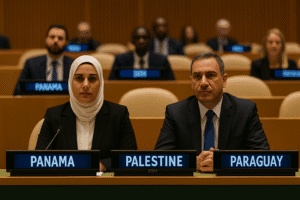Beyond Alphabetical Order: What the UN’s 2024 Palestinian Status Shift Truly Means
In 2024, the UN General Assembly enacted a quiet yet powerful shift by placing Palestine alphabetically among recognized states—between Panama and Paraguay—despite its continued non-member status. This symbolic gesture is matched by substantive gains: Palestine now has the right to propose resolutions, speak on broader agenda items, and participate more fully in UN functions.
These privileges mark a meaningful step in its decades-long pursuit of international recognition. Yet, full UN membership remains blocked by persistent U.S. vetoes at the Security Council, highlighting the disconnect between global consensus and geopolitical barriers.
The move signals mounting frustration with stalled peace efforts and reinforces the two-state solution as the prevailing global vision. Still, skeptics argue that without changes on the ground—such as halting settlement expansion or achieving Palestinian political unity—these diplomatic wins may ring hollow. Ultimately, this upgrade strengthens Palestine’s voice, but only political courage and genuine negotiations can transform symbols into lasting peace.

Beyond Alphabetical Order: What the UN’s 2024 Palestinian Status Shift Truly Means
The image is striking: delegates from Palestine taking their seat at the United Nations General Assembly, positioned alphabetically between Panama and Paraguay. This seemingly mundane procedural shift, enacted in 2024 despite Palestine’s ongoing non-member status, is far more than symbolic seating. It represents a significant, hard-fought diplomatic milestone laden with implications for the elusive two-state solution.
Beyond the Seat: The Substance of the Shift
While full UN membership remains blocked – notably by a US veto in the Security Council just months earlier – the General Assembly’s 2024 resolution granted Palestine tangible new rights:
- Alphabetical Placement: Seating Palestine among recognized states visually affirms its claim to statehood on the global stage daily.
- Right to Propose Resolutions: For the first time, Palestine can directly initiate resolutions and decisions within the General Assembly and its committees, moving beyond merely reacting or co-sponsoring.
- Enhanced Participation: Strengthened rights to speak on broader agenda items and participate more fully in UN conferences.
These aren’t just procedural tweaks. They amplify Palestine’s diplomatic voice and agency within the UN system, reflecting the will of the vast majority of member states (142 out of 193) who already recognize Palestine bilaterally.
A Long Arc of Diplomatic Struggle
This moment didn’t emerge in a vacuum. It’s the latest chapter in a decades-long Palestinian quest for international recognition at the UN:
- 1947: The UN Partition Plan (Resolution 181) envisioned separate Jewish and Arab states. Accepted by Zionist leaders, rejected by Arab states and Palestinians, it set the stage for conflict and displacement (the Nakba).
- 1974: PLO leader Yasser Arafat addressed the GA, famously holding “an olive branch and a freedom fighter’s gun.” The GA recognized Palestinian rights to self-determination and independence, granting the PLO observer status.
- 2012: A major upgrade to “non-member observer State” status, implicitly recognizing statehood.
- 2011 & 2024: Formal bids for full UN membership, both stymied by the US veto in the Security Council despite likely majority support in the GA.
The Persistent Shadow: US Veto Power and Geopolitics
The 2024 status upgrade underscores a recurring theme: the gap between broad international consensus on Palestinian rights and the geopolitical realities enforced by the US veto. Washington has wielded its veto over 30 times since 1972 on resolutions perceived as critical of Israel. While occasionally abstaining (as in the landmark 2016 settlement resolution and the 2024 Gaza ceasefire call), the US remains the decisive barrier to full Palestinian UN membership. The 2024 GA move is a direct response to this impasse – an effort to maximize Palestinian standing within the constraints imposed by the Security Council’s structure.
Symbolism vs. Substance: The Two-State Dilemma
The critical question remains: Do enhanced UN rights translate to progress on the ground towards a viable two-state solution? Proponents argue:
- It strengthens the Palestinian negotiating position internationally.
- It reinforces the concept of Palestinian statehood as the accepted international framework for peace.
- It maintains pressure on Israel and the international community to engage seriously with the two-state paradigm.
Skeptics counter:
- Without corresponding changes in Israeli policy (settlement expansion, security control) or Palestinian unity and governance, diplomatic wins in New York feel hollow.
- It could harden Israeli positions, viewing it as unilateralism bypassing direct negotiations.
- It doesn’t address core final status issues: borders, Jerusalem, refugees, security.
The Path Forward: More Than a Seat Assignment
The UN’s 2024 decision is a testament to the enduring, albeit frustrated, international commitment to Palestinian self-determination. It grants Palestine a louder voice and a more equal procedural footing within the world’s primary diplomatic arena. However, it is not a substitute for the political will needed to break the deadlock.
The alphabetical placement between Panama and Paraguay is a powerful symbol. But true progress towards two states living side-by-side in peace requires moving beyond symbolism. It demands courageous leadership, difficult compromises, an end to violence and incitement, a freeze on actions undermining trust (like settlements), and a renewed, credible peace process that addresses the legitimate aspirations and security needs of both peoples. The UN has given Palestine a better seat at the table; the world now watches to see if the table can finally host a genuine negotiation.
You must be logged in to post a comment.